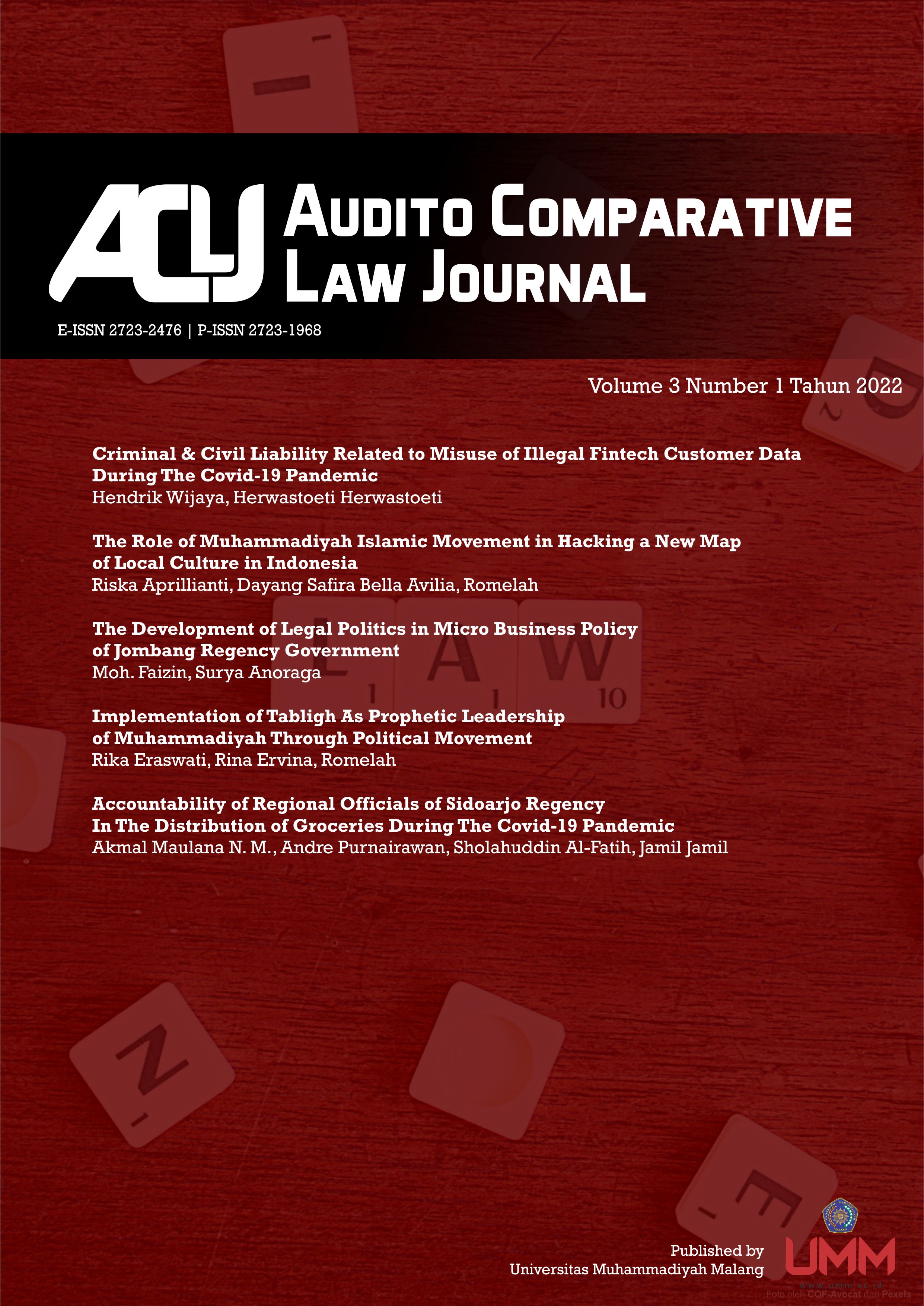Implementation of Tabligh As Prophetic Leadership of Muhammadiyah Through Political Movement
DOI:
https://doi.org/10.22219/aclj.v3i1.19619Keywords:
Tabligh, Muhammadiyah, Political MovementAbstract
One of the forces of civil society that is always present and makes a real contribution to the progress of Indonesian politics is the Islamic mass organization Muhammadiyah. In order to achieve the aspired goals, the Muhammadiyah leadership model exists as the basis or ideology in achieving such goals, especially in Muhammadiyah's contribution to national legal politics. The purpose of this study is to determine the implementation of Tabligh as prophetic leadership of Muhammadiyah in its role as a political movement to influence the national political process. This paper was built based on a literature review. Indonesia is a democratic country and Muhammadiyah was born as a political movement in influencing the national political process. It is a form of citizen aspirations that was formed using an association of groups or organizations as guaranteed by the 1945 Constitution. Muhammadiyah, in their every struggle including in national politics, always uses its identity or ideology as a da'wah organization based on "amar ma'ruf nahi munkar" that is sourced from the Qur'an and Sunnah. Muhammadiyah implements the nature of Tabligh in carrying out its role as a political movement which is to always criticize any regulations that are contrary to the truth or that will bring harm to society. Muhammadiyah is not in a coalition with the government or with any political party, but Muhammadiyah has always supported policies that lead to the benefit of society.
Downloads
References
Aditya, Z Firma, & Al-Fatih, S. (2017). Democracy and Human Rights As A Solution To Resolve The Humanitarian Crisis In Muslim Countries. Conference On Islamic Studies (ICIS), 2–16. https://ssrn.com/abstract=3527977
Aditya, Zaka Firma, & Al-Fatih, S. (2020). Indonesian constitutional rights: expressing and purposing opinions on the internet. International Journal of Human Rights, 0(0), 1–25. https://doi.org/10.1080/13642987.2020.1826450
Al-Fatih, S. (2020). Pembentukan Norma Ambang Batas Parlemen dalam Perspektif Teori Ktiris Jurgen Habermas. Audito Comparative Law Journal (ACLJ), 1(1), 24–37. https://doi.org/10.22219/audito.v1i1.12783
Al-Fatih, S., Hidayah, N., & Anggraeny, I. (2021). Islamic Law as A Value to Solve The Humanitarian Crisis: Lessons from Indonesia. 3rd International Conference on Indonesian Legal Studies, 1–7. https://doi.org/10.4108/eai.1-7-2020.2303662
Aprilianti, R., Avilia, D. S. B., & Romelah. (2022). The Role of Muhammadiyah Islamic Movement in Hacking a New Map of Local Culture in Indonesia. Audito Comparative Law Journal (ACLJ), 3(1), 10–17. https://doi.org/10.22219/aclj.v3i1.19857
Argenti, G. (2017). Civil Society Dan Politik Moral Muhammadiyah. Jurnal Politikom Indonesiana, 2(2), 82–104. https://doi.org/10.35706/jpi.v2i2.968
Cahyani, T. D., & Al-Fatih, S. (2020). Peran Muhammadiyah dalam pencegahan dan pemberantasan tindak pidana korupsi di kota batu. Justitia Jurnal Hukum, 4(2), 117–123. https://doi.org/10.21532/apfj.001.18.03.01.14.Volume
Dermawan, A., Warsito, T., & Zainuddin, M. (2019). Perilaku Politik Elite Muhammadiyah Pada PILKADA. Asy-Syir’ah Jurnal Ilmu Syari’ah Dan Hukum, 53(1), 1–30. http://dx.doi.org/10.14421/asy-syir’ah.2019.53.1.%25p
Dewi, E. R., & Dkk. (2020). Konsep Kepemimpinan Profetik. Al-Muaddib :Jurnal Ilmu-Ilmu Sosial Dan Keislaman, 5(1), 147–159. http://dx.doi.org/10.31604/muaddib.v5i1.147-159
Erdianti, R. N., Wasis, W., & Fatih, S. Al. (2021). Creating Muhammadiyah 9 Malang Elementary School As A Children- Friendly School In Preventing Children To Be Victims Of Violence In School Environment. Jurnal Pengabdian Hukum Indonesia (Indonesian Journal of Legal Community Engagement), 4(1), 77–88. https://doi.org/10.15294/jphi.v4i1.45087
Faridi, F. (2021). Al-Islam dan Kemuhammadiyahan (Aik) dalam Pandangan Mahasiswa Universitas Muhammadiyah Malang (UMM). Falasifa: Jurnal Studi Keislaman, 12(1), 50–64. https://doi.org/10.36835/falasifa.v12i1.456
Handayani, P., & Faizah, I. (2021). Al Islam dan Kemuhammadiyahan - 3 (AIK -3). UMSIDA Press. https://doi.org/10.21070/2017/978-979-3401-77-5
Herdiansah, A. G. (2016). Peran Organisasi Masyarakat (ORMAS) Dan Lembaga Swadaya Masyarakat (LSM) Dalam Menopang Pembangunan Di Indonesia. Sosioglobal Jurnal Pemikiran Dan Penelitian Sosiologi, 1(1), 49–67. https://doi.org/10.24198/jsg.v1i1.11185
Khoiri, N. (2013). Pemikiran Politik Hukum Islam Muhammadiyah. Asy-Syir’ah Jurnal Ilmu Syari’ah Dan Hukum, 47(1), 169–218. http://dx.doi.org/10.14421/asy-syir’ah.2013.%25x
Korompot, M. I. S., Al-Fatih, S., & Pradhan, D. (2021). The Principle of Equality Before the Law in Indonesian Corruption Case : Is It Relevant ? Journal of Human Rights, Culture and Legal System, 1(3), 135–146. https://doi.org/10.53955/jhcls.v1i3.13
Muntoha. (2009). Demokrasi dan Negara Hukum. Jurnal Hukum Ius Quia Iustum, 16(3), 379–395. https://doi.org/10.20885/iustum.vol16.iss3.art4
Nasrudin, J. (2018). Politik Identitas dan Representasi Politik. Hanifiya: Jurnal Studi Agama-Agama, 1(1), 34–47. https://doi.org/10.15575/hanifiya.v1i1.4260
Nilwan, N. (2016). Kiprah Muhammadiyah dalam Kancah Politik Nasional. Tarbawi Jurnal Pendidikan Agama Islam, 2(2), 33–43. http://dx.doi.org/10.29406/.v2i2.247
Patamatta, J. D., & Jumardi, A. (2020). Konsep Negara Hukum di Indonesia. Al-Amin: Jurnal Kajian Ilmu Dan Budaya Islam, 3(1), 69–82. https://doi.org/10.36670/alamin.v3i1.41
Rahman, A., Ahmadin, A., & Rifal, R. (2021). Peran Strategis Nahdlatul Ulama dalam Penguatan Nasionalisme Kemanusiaan Untuk Menangkal Radikalisme. Jurnal Artefak, 8(2), 97–110. http://dx.doi.org/10.25157/ja.v8i2.5555
Setiawan, I. (2017). Islam dan Nasionalisme: Pandangan Pembaru Pendidikan Islam Tentang Nasionalisme. Jurnal Pendidikan, 5(2), 150–159. https://doi.org/10.26618/equilibrium.v5i2.1046
Siregar, M. B., Haruni, C. W., & Anoraga, S. (2021). Analisis Larangan Rangkap Jabatan Menteri yang Berasal dari Unsur Partai Politik dalam Sistem Ketatanegaraan Indonesia. Indonesia Law Reform Journal (ILREJ), 1(1), 88–110. https://doi.org/10.22219/ilrej.v1i1.16127
Syams, A. N. (2018). Implementasi Prophetic Leadership di MI Nurul Ulum Bantul. EDUKASIA ISLAMIKA Jurnal Pendidikan Islam, Volume 3, 106. https://doi.org/https://doi.org/10.28918/jei.v3i1.1681
Syarief, A., Maarif, M. S., & Sukmawati, A. (2017). Pengaruh Gaya Kepemimpinan dan Budaya Organisasi Terhadap Komitmen Organisasi dan Perilaku Kewargaan Organisasi. Jurnal Manajemen Dan Organisasi, 8(3), 173-=188. https://doi.org/10.29244/jmo.v8i3.22447
Tanthowi, P. U. (2019). Muhammadiyah dan Politik: Landasan Ideologi Bagi Artikulasi Konstruktif. Tajdida: Jurnal Pemikiran Dan Gerakan Muhammadiyah, 14(2), 93–113. https://doi.org/10.47651/mrf.v14i2.65
Umami, R., Haruni, C. W., & Esfandiari, F. (2021). Tingkat Partisipasi Politik Masyarakat dalam Pilkades Serentak Tahun 2019. Indonesia Law Reform Journal (ILREJ), 1(1), 143–152. https://doi.org/10.22219/ilrej.v1i1.16123
Widyakso, R., & Wiryani, F. (2021). Analisis Pelaksanaan Putusan Peradilan Agama Terhadap Nafkah Perceraian Dalam Perspektif Hukum Nasional dan Hukum Islam Bagi PNS. Audito Comparative Law Journal (ACLJ), 2(2), 86–109. https://doi.org/10.22219/aclj
Downloads
Published
How to Cite
Issue
Section
License
Copyright (c) 2022 Rika Eraswati, Rina Ervina, Romelah

This work is licensed under a Creative Commons Attribution-ShareAlike 4.0 International License.








